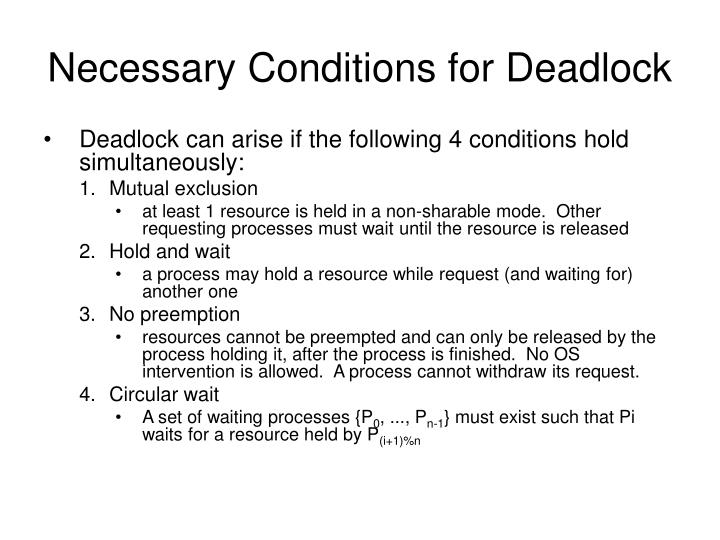
Using this problem I'll show the cause of the deadlock and by preventing the Coffman Conditions, one by one, show how the application no longer deadlocks.īut let's start at the beginning with an application that does deadlock. Such an arrangement might lead to a deadlock as each philosopher might hold one of their forks, but are unable to grab the second fork because it is already held by someone else.Īs all philosophers are waiting for someone else to drop a fork the system deadlocks and no philosopher will be able to grab a second fork or drop the current one they hold. After eating for a while the philosophers drops the forks making them available for someone else.Ī diagram of the problem shows the five philosophers and the forks (and because I can't do graphics or diagrams my forks looks like diamonds):Īs can be seen from the diagram, if the green philosopher holds fork 1 and 2, then the yellow philosopher (for example) is unable to eat as he cannot grab fork 1, only fork 5. Since the forks are shared between two plates a philosopher is only able to grab a fork if it is not already held by another philosopher. Each philosopher needs to think and eat but to eat they need to Has a detailed article on it, but in short it goes something like this įive philosophers are sitting in front of five plates of food, between each plate is one fork.

The Dining Philosophers problem is a classic problem used in computer science to illustrate concurrency and locking problems, it was initially formulated by Edsger W. Running the applications results in a whole lot of text being outputted but there's no UI implementation.

Both downloads contain six different console applications Īll of these are variations on the same console application implementation of Dining Philosophers with the first one, DiningPhilosophers.Deadlock resulting in a deadlockĪnd the other ones either detect or prevent deadlocking by preventing one of the Coffman Conditions from being fulfilled. There are two downloads for this article, a VB.NET version, DeadlockVB.zip, and for completeness a C# version, DeadlockCS.zip. It is very possible this approach makes it harder to translate the contents of thisĪrticle to a real life scenario, for that I apologize.
DEADLOCK AVOIDANCE CODE
In this article I will be taking a fairly academic approach and the implementations I provide to avoid the deadlock are simple and obvious, this is rarely theĬase in production code but for clarity I have decided to keep things cut-down. Preventing or avoiding a single one of these conditions stops a deadlock from happening, but deadlocks are still not uncommon in production code. The article uses the Dining Philosopher problem as a basis for discussion.Īvoiding a deadlock is in theory quite simple as there are four, well defined, conditions that must all hold true simultaneously for the code to deadlock.
DEADLOCK AVOIDANCE HOW TO
I will also provide a sample implementation of how to detect when a deadlock occurs In this article I will discuss deadlocks, what they are and how they can be avoided. Std :: scoped_lock guard ( mutex1, mutex2 ). Std :: lock internally to guarantee no deadlocks take place: Alternatively (and preferably) you will pass the mutex’es to Unlock ( ) explicitly on the mutex’es if that is what you desire. Std :: lock ( mutex2, mutex1 ), but you will still need to call Std :: lock ( mutex1, mutex2 ), while thread 2 calls Std :: lock will perform deadlock resolution magic, even if thread 1 calls Lock ( ) calls in the right order rather a more elegant, automatic solution is desired here. But locking not just by explicitly writing the The way to improve all that is wrong with the above code is to always lock the mutex’es in the same order, and have a mutex owning local object handle the unlocking, whether exiting the function normally or due to an exception. A perfect solution to both issues already exists: the RAII technique. ) the locks you acquired will not be automatically released. Unlock ( ) on a mutex you previously locked, and 2) in the presence of exceptions emitted fromĭO_SOME_WORK (. This is dangerous because 1) you may forget to call

Another thing I would like to point out in the above example is the explicit calls to


 0 kommentar(er)
0 kommentar(er)
